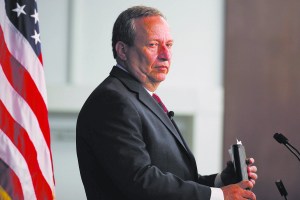Notes From the Pacific: A Year Into the Recovery Chatter, Lessons to Take Away From the Far East
By Sam Chandan September 16, 2010 3:02 pm
reprints The emergence from recession in the United States and Europe has been lackluster. A year after the first issue of The Commercial Observer reached its select readership, headline measures of growth in the former show that the economy has slowed from its early, headier pace of recovery.
The emergence from recession in the United States and Europe has been lackluster. A year after the first issue of The Commercial Observer reached its select readership, headline measures of growth in the former show that the economy has slowed from its early, headier pace of recovery.
And while the labor market has stanched the frightful job losses of late 2008 and early 2009, the American economic engine has yet to spur meaningful new job gains. Basic questions about the nation we will be in the 21st century–embodied in the debates over health care legislation and the extension of expiring tax cuts–cloud the business outlook and, until the opaque skies clear, hamper investment.
And so there is talk of the potential for a double dip that might erase the modest gains of the past year. Will it be slow growth or no growth? Economists, with their meager macroeconomic forecasting tools, continue to debate how to compel a return to expansion. In Washington, the approaching election has turned many politicians into economists in their own right. Worse yet, every economist is now an unwitting politician. Professors, be warned: Your academic assessment of the Bush tax cuts might also signal your views on free speech, gays in the military, the burning of sacred texts and your voting intentions in November.
I WRITE THIS week’s column from the confines of a transpacific flight, making my way from the familiar surroundings and quandaries of New York City for a week of speaking engagements and meetings along the Asian Pacific Rim. However hectic the upcoming week’s schedule, it offers an opportunity to put our domestic mare’s nest into a larger context.
As it turns out, I am not the only one making an eastward sojourn. On the cover of The Wall Street Journal‘s rather slight Asia edition, there is news of Governor Schwarzenegger’s weeklong trade mission. Larry Summers, as well, was in the neighborhood just last week.
There was a time, in the long days of the Cold War and more than a decade following the Sino-Soviet split, when only Nixon could go to China. Now, almost 40 years after the late president’s historic meeting with Chairman Mao Zedong, the world’s attention –like the governor’s and former Treasury secretary’s–is turning ever more eastward. The U.S. economy returned to some measure of growth a year ago, in the third quarter of 2009. But in order of magnitude, China has been at the helm of the global recovery.
In the United States, China’s growing prominence on the economic, political and military stage is greeted with a balance of awe and consternation. Ongoing disputes over a host of issues, ranging from currency policy and a persistent trade imbalance to engagement with North Korea and controls on the export of rare earth metals, have fueled perceptions in the West that China will not acquiesce to our particular rule book.
The currency question, in particular, has raised the ire of policy makers. The House Ways and Means Committee will convene on Wednesday and Thursday of this week to consider the issue. And if a hard line on China resonates with voters, we will certainly hear more on this issue from Congress as Election Day approaches. The testimony to watch will be that of Treasury Secretary Geithner, scheduled for Thursday. The tenor of his comments will undoubtedly prefigure the administration’s broader engagement strategy.
When thinking about our uncertain future, an acknowledgement of China’s current success can be instructive. If nothing else, it tells us that a highly controlled market economy can still experience rapid growth. I am certainly not suggesting that we should abandon our stronger and unequivocal embrace of free markets. I only concede that growth can occur under different models.
Given the near certainty of a more regulated business and financial environment in the United States, it is worth observing that China’s most successful real estate market participants are those that have adapted to the wondrous complexity of its regulatory environment.
With that in mind, there is hope for us yet.
schandan@rcanalytics.com
Sam Chandan, Ph.D., is global chief economist and executive vice president of Real Capital Analytics and an adjunct professor of real estate at Wharton.



